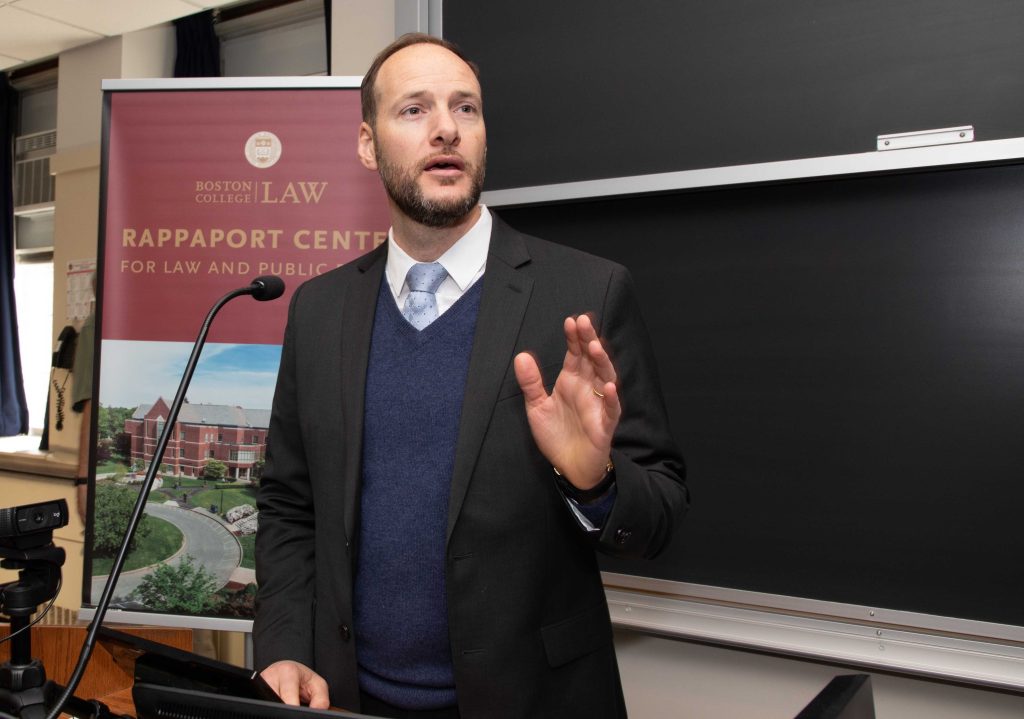Chesa Boudin, a former San Francisco district attorney who raised hackles for his progressive policies, riveted a packed auditorium January 30 with his community address as the Rappaport Center for Law and Public Policy’s Senior Fellow in Residence. The talk, “Criminal Justice Reform: The Role of the Progressive Prosecutor,” was both personally and politically enlightening.
Boudin began with his childhood. As a baby, both of his parents were arrested and sentenced to long prison terms, a combined sixty-two years. “I, like millions and millions of other American children, grew up having to go through metal detectors and steel gates just to see my parents, just to be able to give them a hug,” he said.
Those decades of prison visits and, as he described, “seeing and living and experiencing the failures of this country’s approach to criminal justice,” informed his ambition to advance criminal justice reforms. Boudin attended Yale College, Oxford University on a Rhodes Scholarship, and returned to Yale for law school. He then clerked for the Ninth Circuit Court of Appeals and the District Court for the Northern District of California. In 2015 he began working as a public defender at the San Francisco Public Defender’s Office.
Fast forward to 2019. Boudin entered the open election for San Francisco District Attorney at a time when jurisdictions across the country were electing “progressive prosecutors”—reform-minded prosecutors committed to ending mass incarceration and implementing reforms like declining to prosecute certain low-level offenses and abolishing cash bail. Boudin brought his own progressive vision to reform the criminal justice system. His campaign centered on three principles: ending mass incarceration, diverting resources to meaningful investments in victim services, and equal enforcement of the law.
“Our reform movement is strong, it is growing, it is broadening.”
Chesa Boudin
He won the ranked-choice election with just 42 percent of the vote and took office in January 2020. As DA, Boudin made meaningful efforts toward the three principles on which he campaigned. Some highlights of his tenure include decreasing the adult population in jail by 40 percent, providing housing to domestic violence victims at the start of the pandemic via partnerships with Airbnb, and charging a member of the San Francisco Police Department with homicide in a use-of-force case. He was the first San Francisco district attorney to bring such a charge.
Boudin’s time in office, however, was cut short. In June 2022 he was the subject of a recall election. His progressive platform made him the target of many opponents, including law enforcement, tech industry leaders, conservatives, and residents concerned about crime. According to The Guardian: “Backed by ultra-wealthy funders, including a billionaire GOP mega donor, the recall supporters raised $7.2m and ran a campaign that blamed Boudin’s policies for the complex problems of crime, violence, homelessness, drug addiction, and other challenges in the city.”
Boudin, however, pointed out that overall crime rates for San Francisco in fact decreased during his tenure. Violent and non-violent crimes fell by an overall 20 percent during the two-and-a-half years he was in office compared to the same period before he took office.
Despite his defeat, Boudin is optimistic about the future for progressive prosecution. In the same election cycle that he lost his recall, Sarah Fair George in Burlington, Vermont, was reelected to a second term, overcoming attacks from the police union. George Gascón in Los Angeles beat his second recall attempt in just six months. Steve Mulroy ran a reform Democratic ticket against an incumbent Republican district attorney in Memphis and won. Kim Foxx and Larry Krasner were also recently reelected in their respective cities of Chicago and Philadelphia with overwhelming majorities. Following Krasner’s election, he was impeached and the Pennsylvania courts are currently deciding whether an impeachment trial can go forward.
“Our reform movement is strong, it is growing, it is broadening. Progress is always going to be two steps forward, one step back but San Francisco is not representative of the trends in the rest of the country,” Boudin said.


